Claude Black may refer to:
- Claude Black (minister) (1916–2009), American Baptist minister
- Claude Black (musician) (1932–2013), American jazz pianist
Claude Black may refer to:

Hair: The American Tribal Love-Rock Musical is a rock musical with a book and lyrics by Gerome Ragni and James Rado and music by Galt MacDermot. The work reflects the creators' observations of the hippie counterculture and sexual revolution of the late 1960s, and several of its songs became anthems of the anti-Vietnam War peace movement. The musical's profanity, its depiction of the use of illegal drugs, its treatment of sexuality, its irreverence for the American flag, and its nude scene caused much comment and controversy. The work broke new ground in musical theatre by defining the genre of "rock musical", using a racially integrated cast, and inviting the audience onstage for a "Be-In" finale.
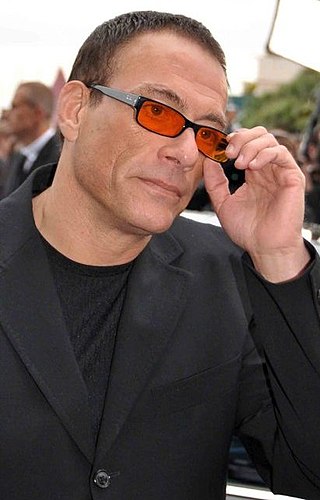
Jean-Claude Camille François Van Varenberg, known professionally as Jean-Claude Van Damme, is a Belgian actor, martial artist, filmmaker, and fight choreographer. Born and raised in Brussels, Belgium, at the age of ten his father enrolled him in martial arts classes, which led to Van Damme participating in several competitions. With the desire of becoming an actor, he moved to the United States in 1982, where he did odd jobs and worked on several films, until he got his break as the lead in the martial arts film Bloodsport (1988).
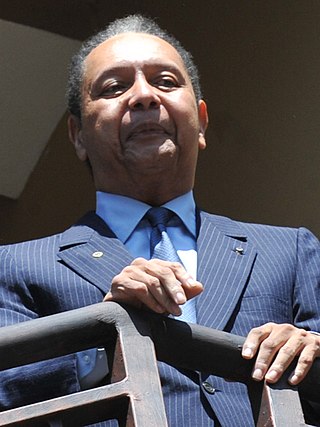
Jean-Claude Duvalier, nicknamed "Baby Doc", was a Haitian politician who was the President of Haiti from 1971 until he was overthrown by a popular uprising in February 1986. He succeeded his father François "Papa Doc" Duvalier as the ruler of Haiti after his death in 1971. After assuming power, he introduced cosmetic changes to his father's regime and delegated much authority to his advisors. Thousands of Haitians were killed or tortured, and hundreds of thousands fled the country during his presidency. He maintained a notoriously lavish lifestyle while poverty among his people remained the most widespread of any country in the Western Hemisphere.

Louis Farrakhan is an American religious leader, black supremacist, anti-white conspiracy theorist, and former singer who heads the Nation of Islam (NOI). Prior to joining the NOI, he was a calypso singer who used the stage name Calypso Gene. Earlier in his career, he served as the minister of mosques in Boston and Harlem and was appointed National Representative of the Nation of Islam by former NOI leader Elijah Muhammad. He adopted the name Louis X, before being named Louis Farrakhan.

A number of organizations and academics consider the Nation of Islam to be antisemitic, stating that it has engaged in Holocaust denial and antisemitic interpretations of the Holocaust, and exaggerates the role of Jews in the African slave trade, whereas mainstream historians, such as Saul S. Friedman, have said Jews had a negligible role. The Nation of Islam has repeatedly rejected charges made against it as false and politically motivated.
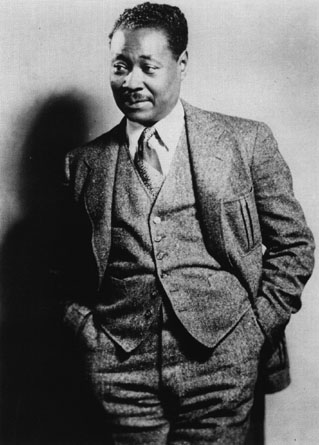
Festus Claudius "Claude" McKay OJ was a Jamaican-American writer and poet. He was a central figure in the Harlem Renaissance.

Etta Moten Barnett was an American actress and contralto vocalist, who was identified with her signature role of "Bess" in Porgy and Bess. She created new roles for African-American women on stage and screen. After her performing career, Barnett was active in Chicago as a major philanthropist and civic activist, raising funds for and supporting cultural, social and church institutions. She also hosted a radio program in Chicago and represented the United States in several official delegations to nations in Africa.
In law, a person is acting in a position if they are not serving in the position on a permanent basis. This may be the case if the position has not yet been formally created, the person is only occupying the position on an interim basis, the person does not have a mandate, or if the person meant to execute the role is incompetent or incapacitated.
David or Dave Black may refer to:
Black is a surname which can be of either English, Scottish, Irish or French origin. In the cases of non-English origin, the surname is likely to be an Anglicisation. Notable persons with that surname include:
Ryan may refer to:
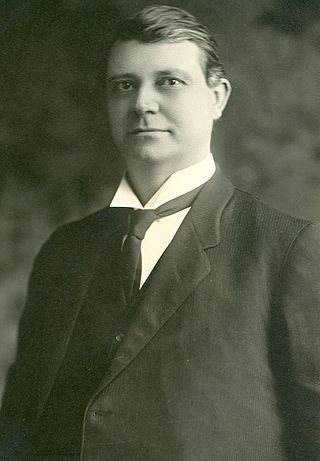
Claude Kitchin was an American politician who served as a member of the United States House of Representatives from the state of North Carolina from 1901 until his death in 1923. A lifelong member of the Democratic Party, he was elected House majority leader for the 64th and 65th congresses (1915–1919), and minority leader during the 67th Congress (1921–1923).
Claude William Black Jr. was an American Baptist minister and political figure. Black was born in San Antonio, Texas, which was segregated at the time. Black's parents are Claude Sr., who served as the Vice President of the Brotherhood of Sleeping Car Porters, and Cora Black, who was a housewife.
The Hebrew Benevolent Congregation Temple bombing occurred on October 12, 1958 in Atlanta, Georgia. The Hebrew Benevolent Congregation Temple, on Peachtree Street, housed a Reform Jewish congregation. The building was damaged extensively by the dynamite-fueled explosion, although no one was injured. Five suspects were arrested almost immediately after the bombing. One of them, George Bright, was tried twice. His first trial ended with a hung jury and his second with an acquittal. As a result of Bright's acquittal, the other suspects were not tried, and no one was ever convicted of the bombing.
Claude Williams may refer to:

The Harlem Renaissance was an intellectual and cultural revival of African American music, dance, art, fashion, literature, theater, politics and scholarship centered in Harlem, Manhattan, New York City, spanning the 1920s and 1930s. At the time, it was known as the "New Negro Movement", named after The New Negro, a 1925 anthology edited by Alain Locke. The movement also included the new African American cultural expressions across the urban areas in the Northeast and Midwest United States affected by a renewed militancy in the general struggle for civil rights, combined with the Great Migration of African American workers fleeing the racist conditions of the Jim Crow Deep South, as Harlem was the final destination of the largest number of those who migrated north.
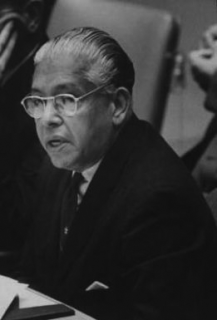
Sir George Claude Stanley Corea, KBE was a Sri Lankan politician and diplomat. Former President of the United Nations Security Council, he had served as the Ceylonese Minister of Labour, Industry and Commerce, the Ceylonese Ambassador to the United States, the Ceylonese High Commissioner to the United Kingdom and the Ceylonese Representative to the United Nations.
Addie L. Wyatt was a leader in the United States Labor movement, and a civil rights activist. Wyatt is known for being the first African-American woman elected international vice president of a major labor union, the Amalgamated Meat Cutters Union. Wyatt began her career in the union in the early 1950s and advanced in leadership. In 1975, with the politician Barbara Jordan, she was the first African-American woman named by Time magazine as Person of the Year.
Black Venus may refer to:
Versatile may refer to: